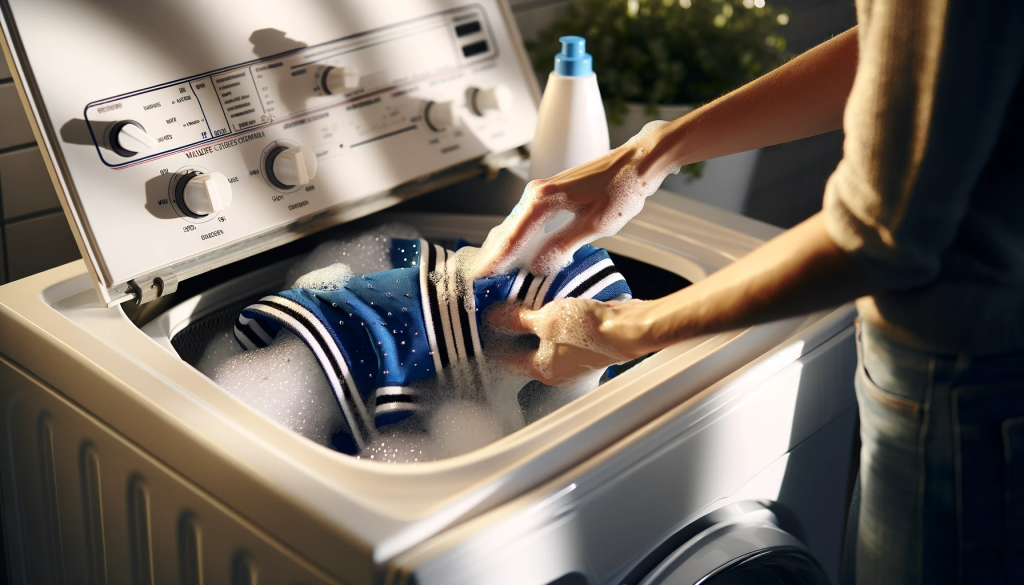Struggling with stiff, lifeless clothes due to hard well water? Discover effective methods to restore your laundry’s softness and vibrancy by exploring our expert tips on detergent choices and washing techniques. For more creative solutions and lifestyle tips, check out InktasticMerch.
Tackling laundry with well water can be quite the task, often leaving your garments feeling rough and coarse rather than fresh and soft. This common issue can, however, be remedied. It’s essential to understand that hard water diminishes detergent’s cleaning ability. Our blog provides actionable strategies to address well water challenges in your laundry. From choosing the best detergent to modifying your washing routine, we’ve got all the insights you need.
Key Takeaways
- Minerals in hard water make laundry difficult, leaving clothes stiff and lifeless. More detergent, high-quality detergents designed for hard water, or installing a water softener can alleviate this issue.
- Natural solutions like vinegar or borax enhance laundry results. Vinegar helps remove mineral buildup, while borax amplifies the detergent’s effect.
- Using warm water during wash cycles aids detergent dissolution, leading to cleaner clothes with less leftover residue.
- Sorting laundry into whites and colors avoids color bleeding and fading. Follow specific care guidelines such as using hot water for whites and cold water for colors to maintain their vibrancy.
- Regular washing machine maintenance is vital in managing well water difficulties. Environmentally friendly detergents benefit both the environment and your home’s safety.
Understanding Hard Water and its Effects on Laundry

Hard water, laden with minerals, presents challenges in achieving truly clean clothes. These minerals accumulate in the fabric, imparting a stiff and faded appearance.
What is hard water?
Hard water is enriched with minerals like calcium and magnesium, absorbed as it travels through earth and stone. This water can leave stains on clothing, leading to a dull and hard texture.
Repeated washing in hard water deteriorates fabric fibers, resulting in weakened and less vivid garments. It also contributes to appliance issues such as leaks and damage.
Minerals in hard water are harsh on fabrics and appliances alike.
How does it affect laundry?
Hard water dulls and coarsens clothes. It diminishes fabric strength, causes color fading, and leaves stains. The mineral content accelerates fiber breakdown, causing clothes to wear out 15 percent faster than those cleaned in soft water.
Resultantly, clothes and linens become dull and discolored, retaining residue that can cause skin dryness and irritation.
Common laundry problems caused by hard water
The high mineral content in hard water complicates laundry chores, leading to several issues.
- Stains on clothes: Mineral deposits in hard water can leave unsightly stains, making laundry appear unclean post-wash.
- Faded colors: High mineral levels hasten color fading, turning vibrant clothing dull.
- Rough textures: Clothing washed in hard water often feels harsh due to residual mineral deposits.
- Increased wear and tear: Clothes cleaned in hard water degrade 15 percent faster compared to those washed in soft water.
- Hard water stains: White or light-colored items often show visible mineral residue.
items can gather stubborn mineral stains that are difficult to eliminate.
These challenges underline the necessity of employing suitable laundry techniques and solutions when dealing with hard water.
Mastering Laundry with Hard Water

Laundry in hard water can be taxing, yet strategies are available to counter these difficulties. Employing additional detergent alongside a water softener can yield cleaner garments.
Increasing Detergent Usage
Encountering hard water necessitates up to 30% more detergent for washing. This additional amount effectively removes oils and grime from your clothing. Selecting the right quantity based on your water’s hardness ensures optimal cleaning.
Adjusting your detergent usage helps alleviate the challenges posed by hard water.
Next, opting for a premium detergent becomes essential for laundering in hard water scenarios.
Choosing Premium Detergent
After increasing detergent amounts, consider transitioning to a top-tier laundry detergent crafted specifically for hard water environments. Liquid detergents perform efficiently in both soft and hard water, making them a flexible option.
For more demanding loads, select detergents with enzymes and additional boosters to effectively handle the minerals in hard water. These components actively break down the stains and buildup attributed to hard water.
Though high-quality detergents may have a higher initial cost, they minimize the need for repeated washes, thus saving both time and energy.
Seek out liquid detergents labeled for hard water use or those indicating they contain enzymes or bleach, ensuring cleaner laundry without the necessity for additional rinsing or detergent.
Adhering to these suggestions results in not only cleaner clothes but also minimizes the hassle associated with doing laundry in hard water conditions.
Opting for Warmer Water
Choosing warmer water for your laundry can greatly influence results when dealing with hard water. Warm temperatures aid detergents in dissolving fully, mitigating negative effects on textiles and resulting in fresher and less residue-laden clothing.
Tackling hard water involves raising water temperature to help break down minerals that cause stiffness and discoloration.
Installing a Water Softener
Introducing a water softener to your home addresses hard water concerns directly from their source. Such devices remove minerals like calcium and magnesium, which contribute to water hardness.
Eliminating these minerals not only results in brighter laundry but also requires less detergent for effective cleaning, significantly boosting detergent performance.
Proper calibration of your water softener is essential to maximally benefit from it. Adjust the device to correspond with your water’s hardness level to ensure a consistent supply of softened water, improving mineral removal and enhancing your laundry results.
Using Natural Alternatives
Beyond considering a water softener, explore natural substitutes like vinegar and borax for laundry care in hard water. White vinegar, in particular, offers a useful solution…Nội dung: is particularly effective at eliminating hard water deposits like calcium and magnesium.
This quality makes it a potent alternative to standard laundry detergents. Simply sprinkle vinegar directly on your garments or integrate it into the wash cycle for softer and cleaner clothes without the use of harsh chemicals.
Borax also amplifies the cleaning efficacy of homemade detergents in hard water regions by enhancing the fight against magnesium and calcium buildup. Add borax along with your preferred detergent to elevate the cleanliness of your laundry without turning to synthetic cleaners.
Tips for Specific Laundry Items

Dedicated care for laundry items, such as whites and colors, helps maintain their vibrancy and prevent color bleeding. Delicates require gentle treatment to ensure longevity.
Whites
To maintain the brightness of white clothing, separate them from colored items. This will prevent color transfer. Wash white towels, sheets, and socks using the hot water setting recommended on their care labels.
Address stains promptly to preserve whiteness. Spot treatments are particularly effective for areas like collars, cuffs, and hems.
Vinegar not only enhances the brightness of whites but also softens the water and helps remove soap residue. Always adjust the detergent amount based on load size and soil level; for heavily soiled clothes or to safely boost brightness, use fabric-compatible bleach.
Colors
Sorting clothes by color is essential to prevent bleeding and fading. For vibrant or dark hues, select cold water; doing so protects and maintains color vibrancy.
Washing whites on their own allows the use of bleach without harming colored fabrics.
Be sure to check labels for colorfastness to ensure your bright garments stay vivid.
For delicates and linens, opt for gentle cycles in cold water, which will protect colors and prevent fading. Refrain from using hot water on colored fabrics as it may accelerate fading.
Delicates
As you transition from color care to delicates, remember that these items need gentle treatment. Use cold water with mild detergent to preserve their appearance. Harsh handling can cause delicates to lose their shape or color.
Dry these items on low heat or air-dry whenever possible.
Before washing, soaking delicate fabrics can help loosen stains without requiring vigorous scrubbing. Some items, especially those made from fine or sheer materials, may be better off with professional dry cleaning instead of home laundering.
Final Tips and Recommendations
Opt for eco-friendly detergents and maintain your washing machine for efficient well water laundry care.
Using environmentally safe detergents
Eco-friendly laundry detergents contribute to cleaner water and energy conservation. They match the cleaning power of conventional soaps. Look for products with the EPA ecolabel for easy identification of safer options.
These green options protect the planet and our health by avoiding harmful chemicals.
Consumer Reports offer insights on natural detergents that exclude harmful substances, safeguarding families. Transitioning to biodegradable or organic fabric cleaners results in cleaner clothes and a healthier environment.
Properly caring for your washing machine
After selecting environmentally safe detergents, maintaining your washing machine is key to its optimal performance. Clean your washing machine regularly to ensure reliability and effectiveness.every 30 days or after 30 washing cycles for optimal performance.
Inspect hoses consistently and avoid overloading the machine to prevent any damage. After each use, leave the door slightly ajar to allow for ventilation and minimize leaks.
For the best care, dissolve powdered detergent in warm water before starting a cold wash. Combine vinegar and baking soda as a natural solution to address residue build-up.
Solving Frequent Laundry Issues
Hard water can pose challenges when doing laundry. It can weaken fibers, make clothes feel rough, and cause colors to fade.
- Scratchy clothes: Add half a cup of vinegar during the rinse cycle to soften fabrics gently, without using harsh chemicals.
- White residue on dark garments: Reduce detergent usage, as hard water makes rinsing soap more difficult. Try using about half of what’s recommended.
- Dull colors: Consider installing a water softener to mitigate the minerals in hard water that dull colors. Rinsing clothes in a water and vinegar mix offers a quick alternative.
- Rapid color fading: Use cold water with a color-protecting detergent designed specifically for hard water.
- Stubborn stains persist: Pretreat spots with a borax and water mix before laundering. It helps break down minerals that cause stains to linger.
- Blue stains: Often caused by improperly dissolved fabric softener in hard water. Use vinegar in the rinse cycle as a natural softener.
Proper washing machine maintenance is crucial in managing hard water issues.
Conclusion
As we transition from tackling laundry problems, we reach the final insights in our fabric care journey. The laundry process not only refreshes clothes but also minimizes pathogen transmission risks.
This detailed guide aimed to dispel myths and provide facts, ensuring you maintain clean, durable garments while following best practices for washing machine upkeep and detergent choice.
Bear these tips in mind to enhance your home laundry routine and reduce the risk of pathogen exposure.
FAQs
1. How can I enhance cleanliness when using well water?
Incorporate a water softener in your washing machine to mitigate hard water effects and boost cleanliness.
2. Can vinegar eliminate soap residue in clothes washed with well water?
Yes, adding half a cup of vinegar to the rinse cycle can effectively remove soap residue.
3. Will a filtration system improve laundry outcomes with well water?
Installing a whole-house filtration system can significantly reduce minerals and impurities, resulting in cleaner clothes.
4. What detergent is best suited for well water?
Opt for detergents labeled as “formulated for hard water” for superior results with well water.
5. How can I prevent rust stains from well water on clothes?
Use a rust remover product designed specifically for laundry with each wash load to prevent these stains.
For more tips and insights on maintaining your garments and home essentials, explore our comprehensive Blog for a wealth of information on fabric care and beyond.




